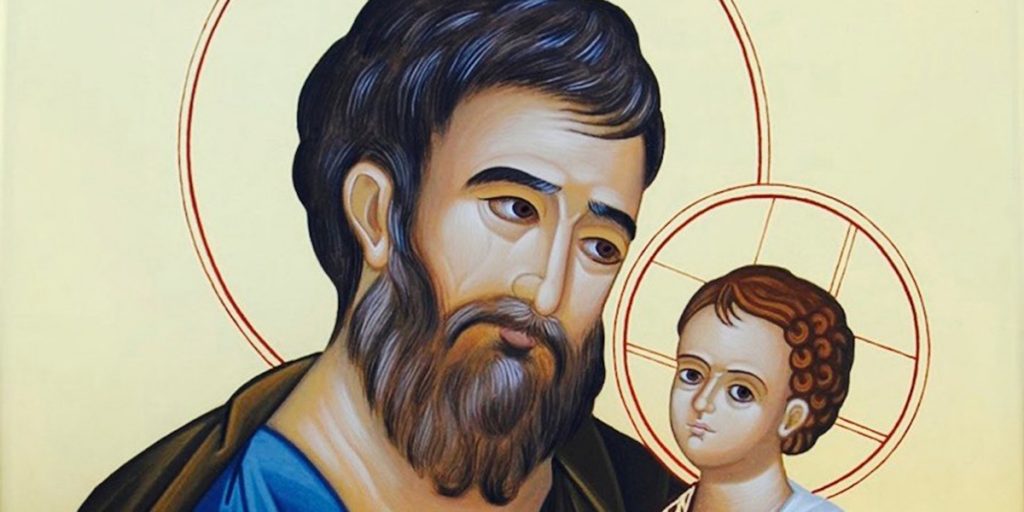In a recent conversation with a respected Church leader, I discovered that there are no historical facts proving that Joseph was an elderly man. Likely, he was only a few years older than Mary.
The two most precious gifts that God has ever given to humanity were Jesus and Mary and He entrusted them to the care and protection of a young man. That says a lot about what God thinks of young men.
[bctt tweet=”The two most precious gifts that God has given humanity, Jesus and Mary, He entrusted to the care and protection of a young man. That says a lot about what God thinks of young men. ” username=”BrettPowellorg”]
Why would the Church foster the tradition that Joseph was significantly older than Mary if he were about the same age? According to Fr Donald Callaway, MIC, the portrait of an elderly Saint Joseph was cultivated to safeguard the virginity of Mary. In his book, Consecration to Saint Joseph, Fr Callaway quoted Bishop Fulton Sheen extensively:
“Somehow the assumption had crept in that senility was a better protector of virginity than adolescence. Art thus unconsciously made Joseph a spouse chaste and pure by age rather than virtue. But this is like assuming that the best way to show that a man would never steal is to picture him without hands. But more than that, to make Joseph out as old portrays for us a man who had little vital energy left, rather than one who, having it, kept it in chains for God’s sake and for his holy purposes” (Venerable Fulton Sheen, quoted by Fr Callaway).
What is the unspoken message to young men? It is this: an old Joseph is more capable of manifesting the virtues necessary to protect innocence than a young Joseph.
If Mary required help against an intruder, a young man’s strength would be a great asset. But if the biggest threat to her purity was unbridled sensuality, then a young man would likely fall short, right? Wrong! Joseph was a young man, full of vitality and strength. And he never failed, not once. He was nothing but an exemplary model of selfless service.

The Church has not prescribed a definitive age to Joseph. We are free to believe he was young and vital or old and patient. Why accept a young Joseph? “Old men don’t walk to Egypt,” was Mother Angelica’s poignant wisdom on the matter. Joseph and Mary made that trip in haste without time to prepare. They also walked from Nazareth to Bethlehem and three times every year they journeyed from Nazareth to Jerusalem to visit the temple. Old men aren’t known for such vigorous physicality.
Joseph was young, in the prime of his life and working days. He loved Mary and continually protected her and Jesus. They lived a normal life as a young family. Furthermore, Mary loved Joseph. He captivated her by the attraction of his virtue. Fr Callaway said that Mary gave her heart to Joseph, as someone in love, even while reserving her body for the presence of God alone. Fulton Sheen had more to say on the subject:
“In Joseph and Mary, we do not find one controlled waterfall and one dried-up lake but rather two youths who, before they knew the beauty of the one and the handsome strength of the other, willed to surrender these things for Jesus. Leaning over the manger crib of the Infant Jesus, then, are not age and youth but youth and youth, the consecration of beauty in a maid and the surrender of strong comeliness in a man.” (Venerable Fulton Sheen, quoted by Fr Callaway)
Wouldn’t you agree, there is something more noble, virtuous, attractive and inspiring about a youth and youth relationship totally consecrated to the Lord, than the image of a young maid protected by a grandfatherly figure?
Not only did Joseph live a life of chastity and self-sacrifice, but he also taught Jesus what it meant to be a man. Jesus would have learned from Joseph how to be both tender and fierce and what it meant to be both passionate and chaste. Jesus also learned from Joseph that to love another is to will the highest good for them and to offer a sincere gift of self in their service. Even as I write these words, I find myself inspired by Joseph as a young man.
[bctt tweet=”Not only did Joseph live a life of chastity and self-sacrifice, but he also taught Jesus what it meant to be a man. To be tender and fierce. To be passionate and chaste. ” username=”BrettPowellorg”]
As I think of how the Church made Joseph “safe” for Mary, I am reminded of a scene from the Lion the Witch and the Wardrobe. The four children have gathered with Mr and Mrs Beaver in their cosy hut. Over a meal, they hear Aslan’s name for the first time. Mr Beaver was sharing about the Great Lion and how he was returning to Narnia. Lucy, whose imagination was captivated by this mythic creature, asked what any child would ask, “Is he safe?” Mr Beaver replied, “Safe, who said he is safe!? No, he isn’t safe, but he is good, I tell you.” A young Joseph is safe and good.

A young Joseph offers an inspiring example to young men today, in two ways.
Find Meaning in Responsibility. Many young men grow up with the idea that getting older means having more privileges in life and fewer responsibilities. But when young men are granted more autonomous freedom, with no added responsibilities, they extend adolescence into their 20’s or even their 30’s. Delaying the inevitable acceptance of responsibility leaves a young man untrained for it when it arrives. And it always does. No wonder anxiety and depression among young men are on the rise. Life is requiring something of them that they are ill-prepared to deliver.
[bctt tweet=”Anxiety and depression among young men are on the rise. Life is requiring something of them that they may be ill-prepared to deliver if they lived a life of extended adolescence. All privilege and little responsibility.” username=”BrettPowellorg”]
God entrusted to the young man, Joseph, the protection of Mary and Jesus. Joseph found meaning and purpose in a sincere self-gift. Rather than trying to extract from them something for himself, he continually laid his life down in their service. Later on, in His public ministry, Jesus spoke these words, “In this is love, to lay down one’s life for one’s friends.” Surely, Joseph would have come to mind when Jesus was preaching.
See Their Vitality as Good. Popular culture is offering a tragic narrative to anyone who will listen. That traditional masculinity is toxic. How does this impact young men? Often when a young man is manifesting a degree of ambition he is labelled prideful or greedy. Also, young men demonstrating assertiveness in sports are thought to be continuing a pattern of male dominance and unbridled bravado. When they are intentionally trying to lead or influence a situation or organization, they are labelled bossy or egotistical.
This narrative creates unnecessary tension in relationships between young men and women and creates additional confusion for young men. I am thankful for the strong voice of Jordan Peterson coming against the destructive narrative of toxic masculinity.
Joseph was an exemplary model of traditional masculinity. He was quiet in the home, hard-working outside the home, provided for his family and encouraged his wife to be a primary source of love and emotional support for his Son. Toxic, right? Not at all. Joseph was a man full of vitality and strength. But he used that strength for the benefit of others, namely Jesus and Mary.
Dear Saint Joseph, pray for our young men. May they be strong, brave, and ambitious in their sincere gift of self for the world. Amen.



Try the Summa, third part question 12 article 2…
Material heresy bro…
Hey Chris,
Thanks for the brief not. Too brief for me to know for certain what you wanted to communicate, feel free to expand.
I’m curious what you meant by, “Material heresy bro.” If you are concerned that when I wrote, “Jesus learned to be a man from Saint Joseph” is evidence of an impious veneration of the hypostatic union, that’s just not true.
Both Aquinas and Ambrose, and many other theologians, propose an understanding of the Hypostatic union that fully appreciates the humanity of Christ aligned to Luke 2:52. “Jesus advanced in wisdom and age and grace with God and men.” Aquinas differentiates infused wisdom from human wisdom. Infused wisdom could not be acquired or evolved. Human wisdom can be acquired and deepened in a human manner – as it was in the Carpenter’s shop or in Mary’s kitchen. This kind of human learning is not a diminishment of the hypostatic union. Therefore, Jesus could learn from Saint Joseph.
I am not the kind of guy to debate online. So, I am happy to receive a thoughtful response if you’d like to offer one but I’m not going to waste my time in an online argument about the Hypostatic union.
I appreciate your zeal and bless you for it.